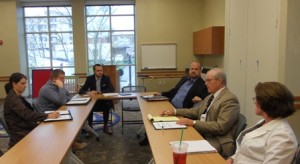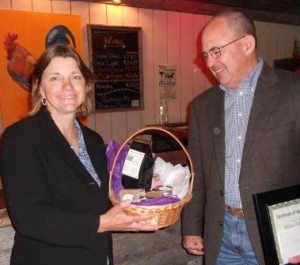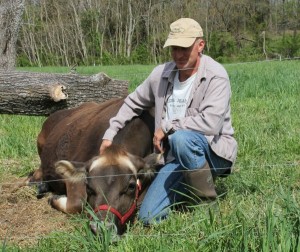Food Freedom Task Force Takes Legislative Initiative to Build Local Food Systems
Food Freedom Task Force Takes Legislative Initiative
August 19, 2014
Task force members met with industry lobbyists on April 15 in Crozet, Va. Pictured from left to right: Lindsay Reames, Eric Paulson, Brad Copenhaver, Randall Anderson, Joel Salatin and Lois Smith. Photo courtesy of The Virginia Food Freedom Task Force.
The Virginia Food Freedom Task Force began its fight for the rights of Virginia’s small farmers and home food producers after House Bill 135, introduced by Delegate Robert Bell, R-Charlottesville, failed to pass during the 2014 General Assembly session.
HB135, also known as the Food Freedom Act, sought to allow the sale of foods by a farm with 10 or fewer employees or by a private home if the food products are sold directly to consumers and if the product is labeled with the producer’s name and address, ingredients and a disclosure statement declaring that the food product is not subject to Virginia’s food safety laws or regulations.
Virginia small farmer Bernadette Barber, of Tall Trees Farm, was directly involved in the conception of the Food Freedom Act and formed the task force.
“We’re looking for foods that can create a wonderful income for a small family farm,” she said. “Honestly, we’re looking for healthier foods.”
The task force, consisting of other small farmers and local officials, met three times in April.
The group worked alongside the bill’s opponents, including the Virginia Department of Agriculture and large food industry representatives, to work toward a new Food Freedom Act created through compromise. However, with no concession from the industry advocates — from the Virginia Agribusiness Council, Virginia State Dairymen’s Association and Virginia Farm Bureau — the task force decided to reintroduce the original bill again for the 2015 General Assembly session.
The group also met with Mike Callicrate, the owner of Ranch Foods Direct and advocate for better American meat production, who spoke to the task force about federal meat laws.
Bernadette Barber and Mike Callicrate
The Issue with Overregulation
Barber said the citizens of Virginia should have more freedom to find local, sustainably-produced foods, including raw milk and certain un-inspected foods.
“The real issue here is the definition of ‘potentially hazardous foods,’ and who controls that definition,” she said.
Currently, this definition is controlled by the U.S. Food and Drug Administration. However, Barber said Virginia citizens should have the power to see for themselves how the livestock and produce they consume is made and choose what foods to buy based on that knowledge.
“We want to find foods that our neighbors make. We can inspect the kitchen ourselves,” Barber said. “All we want is to meet the person who is making our food and shake their hand and know that our dollars are staying within our community.”
Task force member Brian Criley, who owns the natural small farm business Slow Grown in Virginia with his wife Kim, told the Virginia Free Citizen that Virginia’s small farmers are often plagued by regulations they were not even initially aware of.
“It kind of stinks to go about your living, not only knowing where you’ve already run into issues (with overregulation), but wondering if there’s another regulation you didn’t know about,” Criley said. “Because with regulators, failure to know is on you, not on them.”
Criley said the government plays too large of a role in the exchange between small farmers and consumers.
Slow Grown in Virginia farmer Brian Criley is a member of the Virginia Food Freedom Task Force.
“If the consumer is happy and feels that I’ve been open with them and we want to conclude an economic deal, the government has no business in that,” he said.
Barber said food and farm restrictions are out of control when it is illegal to even buy a homemade pumpkin pie from a neighbor.
“Most any pumpkin pie that’s made within a home that’s sold directly to a neighbor, that’s only traveling four miles down the road, is not going to create a health hazard risk in our communities,” she said. “I think that is so far removed from Virginia’s population, it’s unreasonable.”
The problems with food safety, Barber said, come when food travels 1,500 miles to the supermarket, all the while going through numerous channels of production and transportation.
When there are many levels of management, Barber said, food safety becomes much more complex.
“You can’t keep track of everything,” she said.
Pete Kennedy, the president of the Farm-to-Consumer Legal Defense Fund, which provides legal consultation and representation for small farmers, told the Virginia Free Citizen that food freedom advocates fight for greater transparency in the food industry.
“Just for families to have the optimal access to nutritious food right now, they need to support these laws,” he told the Virginia Free Citizen, “just freeing the farmers of the burdensome regulatory system that still exists in the food industry.”
Barber’s hope is to return to the time when buying un-inspected foods from your community was completely legal, and those foods remained safe and healthy.
“We don’t have inspectors in homes when people are making dinner,” Barber said. “Even though it is not tailored to some scientific data somewhere, we still have a track record of producing wholesome and safe foods for families and neighbors.”
The Fight for Better Meat Options
Part of the task force’s focus is tackling factory farm meat production.
The Wholesome Meat Act of 1967 was introduced with the message of safer meat production in America. However, Barber said the quality of meat production and processing in the U.S. today is unsatisfactory.
“We’ve got pink slime and massive recalls and foreign countries owning our meat production facilities,” Barber said.
She said very safe small-scale slaughterhouses and butcheries went “belly-up over night” because of the passage of the 1967 pact, as they could not accommodate the needs of the newly-appointed federal meat inspectors.
After these smaller meat-processing institutions fell away, larger companies acquired the original market share, leaving farmers to travel great distances to have their meat processed, Barber said.
Now, foreign companies are playing an ever-increasing role in the American meat industry.
“It’s amazing how many outside corporations own American food,” Barber said.
Shuanghui International Holdings Ltd., a Chinese corporation, recently purchased Smithfield Foods, while JBS, an organization that is headquartered in Sao Paola, Brazil, just purchased a large poultry operation in Virginia’s Shenandoah Valley.
These large industrial agricultural corporations, she said, thrive off of government subsidies.
“We’re subsidizing the entire system so Shuanghui and JBS can gain huge profits off the American taxpayer,” Barber said.
Task force member Joel Salatin, of Polyface Farm in the Shenandoah Valley, told the Virginia Free Citizen that the quality of American food production downgraded when the factory farm system came into place.
Joel Salatin is another small local farmer on the task force. Salatin runs Polyface Farms in the Shenandoah Valley. Photo courtesy of Joel Salatin.
“Our greater agricultural template in the western world is a mechanical view toward life. We just view it as a factory … without any moral or spiritual ramifications,” he said. “When fewer and fewer people have their hands in the soil and participate in the wonders of visceral, ecological networking, we actually become a very unreasonable culture.”
Barber said we must advocate for the individual freedoms of small farmers in order to counteract the impact of foreign conglomerates and other industrial agricultural corporations.
“Eventually, we are going to have to push federal law to allow farmers to process on their own land,” she said.
A major issue in Virginia’s food and farm freedom movement, Barber said, is that removing restrictions on meat inspection in the state would interfere with federal law.
The question, Barber said, is whether to introduce legislation that directly conflicts with federal law.
Food and farm reform can be complicated, Barber said, because various agencies have control over different parts of the food industry. This confusion keeps food and farm freedom advocates from enacting changes, she said.
“When you craft language to encompass all of food, you’re walking into a whole lot of territory with different regulatory agencies,” she said.
The Raw Milk Debate
Barber is also advocating for the legalization of raw milk sales in Virginia.
Barber said her young son, who struggled with chronic allergies for the first four years of his life, is a “prime example” of someone who benefits from consuming raw milk.
Because of his allergies, Barber’s son was hospitalized multiple times, which had a traumatic effect on Barber and her family.
“You have no idea if your son is going to make it out,” Barber said. “It was frightening.”
When Barber began giving her son local honey and raw milk, instead of store-bought milk, she said his symptoms quickly cleared up and he is now free from allergic reactions.
Barber said she discovered that many parents of children with allergies have switched to raw milk.
Despite the alleged health benefits, raw milk remains largely opposed by government and industry groups.
“That is not a unique story,” she said. “Doctors everywhere tell you to get your kids off of milk and it helps the allergy situation.”
Barber says she rarely buys industrially-produced milk and believes other Virginia consumers should have the freedom to choose raw milk over supermarket milk.
“(We have to) say, ‘you know what, I can decide for myself if I would like to buy milk from a local farmer directly and not have it go through a processing plant,’” she said.
Brad Copenhaver of the Virginia Agribusiness Council, who attended the task force’s meeting with representatives from the food industry, stated in an email that the the focus of the meeting was the legalization of the sale of unpasteurized dairy products, which the Virginia Agribusiness Council opposes. Copenhaver also stated that the meeting attendees did not discuss any “detailed proposal with specific language” for a legislative compromise.
“The Virginia Agribusiness Council has a longstanding policy to oppose (the sale of unpasteurized dairy products) due to public health and food safety concerns,” Copenhaver stated. “Should one (proposed compromise bill) be shared with the Council, I will be happy to work with our members to receive their feedback on a proposal.”
Eric Paulson of the Virginia State Dairymen’s Association, who also attended the task force’s meeting with food industry representatives, stated in an email that the Virginia State Dairymen’s Association also takes issue with the sale of raw milk.
“We have serious concerns about the sale of raw un-inspected milk and the food safety issues that accompany it,” Paulson stated.
Education Efforts
Barber said her biggest goal through her advocacy efforts is education. She is devoted to educating the general public, including other farmers, about the importance of farm freedom and breaking the status quo of factory farming.
Barber urges Virginia citizens to contact their local representatives to inform them about the growing food and farm freedoms movements and their concerns regarding factory farm production.
“We have to take our freedoms back,” Barber said.
For more information about food and farm freedom, check out VFC’s Farm Freedom Series.




